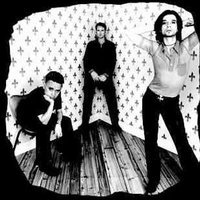 |
Last night, as Depeche Mode pummeled through an exhilarating set that had the entire crowd grooving along; we couldn't help but be reminded of that historic 50th Anniversary show from the world's greatest rock n' roll band this past spring in the same arena.
Depeche Mode's Delta Machine Tour marks over 30 years for the group, which transcended their synthy-sweet new wave beginnings a long time ago and have now secured their place as bonafide stadium rockstars. Their influence and longevity is no fluke, and last night, they moved our bodies and our minds nearly to tears with music new and old.
The show offered vibrant visuals and stellar selection of dance-y numbers and gloomy ballads. Frontman Dave Gahan still seduces the crowd with his beautiful, brutal croon and bombastic hip shakes.
Though he's 52, almost 20 years younger than Jagger, Gahan has a similar physicality on stage. Outfitted in black pants and a vest with no undershirt, he pranced and prowled, and twirled to the beat like a giddy ballerina. He also offered his signature Jesus-pose, arms outstretched wide.
Done by a lesser performer, the move could come off as grandiose, but Gahan's gift for immersing himself in the moment makes him so compelling to watch, he could get away with anything. We were especially enraptured with hits like "Personal Jesus," "A Question of Time" and "Enjoy The Silence," all of which came near the set's end last night.
 |
Depeche's drama and passion is mostly Gahan, but its tempestuous heart belongs to Martin Gore, who has also written most of the band's biggest hits. Gore may be looking his age a bit more than his co-hort, but he seemed just as sprite on stage playing guitar and taking front and center for lead vocals on "A Question of Trust" and "Condemnation."
 |
Gore's turn on the mic is not unlike the moment when Keith Richards takes over for Jagger during a concert. While dancing and chanting along are mostly what it's all about, real fans savor the stripped down, less audacious moments too. Gore may lack Gahan's charisma, but on stage he provides the emotional moment wherein the complexities of love and self that inspire Depeche Mode's music can fully be appreciated.
With perhaps the exception of The Cure, nobody conveyed adolescent angst as beautifully or achingly in the late '80s as Depeche Mode, and at Staples, the 40-somethings in the crowd soaked in the bittersweet nostalgia of their lyrics and what they originally meant to them.
To be sure, Depeche Mode still create potent musings, which plays with themes of despair and inner demons. The new Delta Machine tracks were good enough sonically to hold their own next to the classics, even without the obvious hit potential. And the old stuff? It, like the band itself, holds up.

